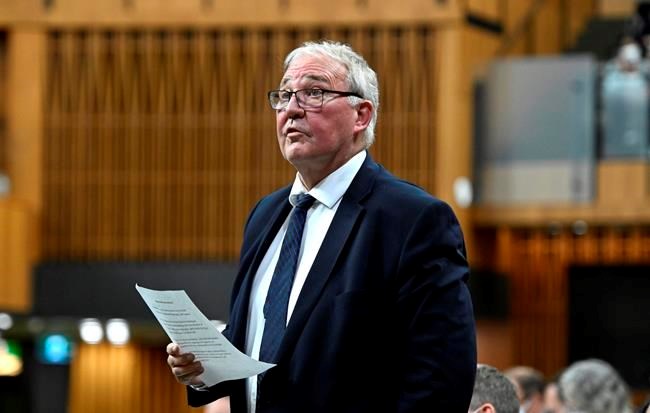OTTAWA — Former public safety minister Bill Blair was asked yet again Wednesday about whether his government interfered in the investigation into the April 2020 shooting spree in Nova Scotia — a question that has grabbed political attention in Ottawa for over a week.
Blair and the Prime Minister's Office are accused of pressuring RCMP Commissioner Brenda Lucki to release details about the type of weapons used by the gunman, with two RCMP officials alleging Lucki told them that information was connected to upcoming gun legislation.
The government announced a ban on assault-style weapons on May 1, 2020, after cabinet approved an order-in-council enacting the changes.
The Conservatives have accused the Liberals of using a tragedy to further their agenda. NDP leader Jagmeet Singh said in a statement last week that it's completely unacceptable for a government to "use this horrific act of mass murder to gain support for their gun policy."
But that's not how a survivor of another mass shooting sees it.
Heidi Rathjen was a student at Montreal's École Polytechnique in December 1989 when a gunman murdered 14 women and injured 14 others at the school.
She said the response to mass shootings should be "political and immediate."
"The Conservatives and the gun lobby have been falling over themselves claiming that the (orders-in-council) were some kind of devious self-serving political move that exploited a tragedy, while for the majority of Canadians banning assault weapons is the right thing to do to prevent mass shootings," she said in an email to The Canadian Press.
"If it took a tragedy to prompt the government into long-awaited action on gun control, that may be a sad commentary on politics, but it is surely beneficial for public safety."
Rathjen, who leads an advocacy group called PolySeSouvient, said it "would have loved" for the government to respond immediately to what happened at Polytechnique.
"Unfortunately, it took six years of advocacy before a reasonable gun control law was passed, and victims’ families are still fighting for a complete ban on assault weapons — three decades later.”
Blair said his office worked with the RCMP on the list of banned weapons for months before the announcement, but those conversations had "no nexus" with discussions about the shooting spree.
"The RCMP of course were involved in those discussions from the outset because they are responsible for administering the Canadian Firearms Program," he said.
Allegations of government interference came to light through evidence released by the public inquiry into the shootings, in written notes from Supt. Darren Campbell and a letter to Lucki written by RCMP strategic communications director Lia Scanlan about a meeting held 10 days after the shootings.
Scanlan's letter, which was written nearly a year later, said Lucki mentioned "pressures and conversations with Minister Blair, which we clearly understood was related to the upcoming passing of gun legislation." Scanlan's perception that the commissioner was under political pressure left her feeling disgusted.
"It was appalling, inappropriate, unprofessional and extremely belittling," Scanlan wrote.
Lucki has acknowledged she did "express frustration with the flow of information" in the meeting.
Blair and Lucki have denied there was any pressure to release a list of the weapons used in the shooting, and neither they nor the Nova Scotia RCMP revealed that information to the public before it was reported by the media in November 2020.
Former police officer Michael Arntfield says if the alleged interference happened, it's unclear how it would have impacted operations or the investigation.
But more importantly, he says, the "juicy political scandal" is distracting from what is supposed to be an inquiry into why and how a man disguised as a police officer and armed with illegal weapons was able to evade police and continue killing for more than 13 hours.
"The larger conversation about systemic problems in the RCMP operationally, administratively, has been paved over," said Arntfield, a professor of criminology at Western University.
Blair said he did have questions for Lucki when they spoke, and made a point to note that the government "did hear very clearly concerns from the people of Nova Scotia" about the RCMP's actions.
He said that's why the public inquiry — which he initially opposed calling — has been tasked with exploring the RCMP's communication.
The force released limited information to the public on Twitter during the shootings.
It sent a single tweet on April 18 warning of a "firearms complaint" in Portapique, even though the communications officer on call that night was aware there were multiple people dead and that the gunman's whereabouts were unknown.
Thirteen people were killed that night and several buildings burned to the ground. The next morning, the gunman took another nine lives as he drove through rural parts of the province, evading police until just before noon.
The inquiry has heard it took 27 minutes to get Scanlan's approval that morning for a tweet warning the public that the gunman was driving a mock RCMP cruiser and wearing a police uniform.
During that time, Kristen Beaton and Heather O'Brien were murdered on the side of the highway in Debert, N.S. Beaton was pregnant when she was killed. Her husband, Nick Beaton, and O'Brien's daughter, Darcy Dobson, led the calls for a public inquiry into what went wrong in July 2020.
"When you pulled the oxygen out of (an inquiry) that was assembled at the behest of bereaved families to get answers about what's wrong with the RCMP, it distracts from the original motivation of the inquiry," Arntfield said, adding the questions about what went wrong are of "life and death interest to Canadians."
This report by The Canadian Press was first published June 29, 2022.
Sarah Ritchie, The Canadian Press


